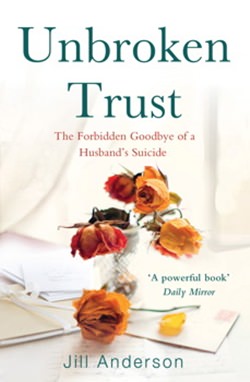The Forbidden Goodbye of a Husband’s Suicide
Written by the wife of a man who committed suicide, this is a very harrowing and moving tale. It was not enough that her husband committed suicide, a fact she has had to live with, but then she was arraigned by the police and charged with involuntary manslaughter and assisted suicide, leading to proceedings in court before a jury.
Unbroken Trust (ISBN 978-1-84983-789-7, Simon and Schuster, 2013) was written by Jill Anderson, the wife of Paul Anderson, a man struck down with Chronic Fatigue Syndrome, a mystery “disease” that is not fully accepted by the medical profession at that time (because there is no specific test for it, diagnosis made by exclusion of other known diseases).

The narrative is taken mainly from the police statements, which of course became evidence for the prosecution.
The progression of CFS is well documented, and one begins to understand his psychological pain (as well as his physical pain), and also her pain, being wife and carer trying to come to terms with a disease for which there was no panacea.
Police trying to trap an exhausted woman, going over and over the final event of her husband’s suicide some months earlier. It is not surprising to me that some of her responses were slightly different than initially.
“At that point, Jill, you’ve made a decision that he wasn’t going to get better. Is that correct?” This is almost entrapment.
The story alternates with vignettes from the past, before he became too infirm, and others when they were able to have a normal married relationship.
The narrative tends to be somewhat repetitive, as does the repetitive questions from the police. It would not be an exaggeration to describe the police questioning as harassment. At one stage she was kept in the police station for over five hours and then was asked to identify many documents that had been taken from her home.
At one point, the police question Jill on private papers and diaries, which she had written to help her cope with her husband’s illness. Those private jottings were meant to be private at all times, and even her husband had never seen the jottings. To say that feelings of rape resulted from this is not too great an association. These jottings were an established method of anger management, but is there no such thing as privacy any more? It would appear not.
At B. 385, this book is not an expensive read. Jill Anderson has written a very moving account of something that could be your worst nightmare. Her use of the English language is very eloquent, making it a very readable book, though the narrative at times would make you weep. There has been much debate about euthanasia, and everyone must make up their own mind and stance on this. This book only portrays one side. However, Jill Anderson was acquitted by the British legal jury system, and I am sure the writing of this book has been a catharsis for her, a person that now deserves some pity and not persecution.




